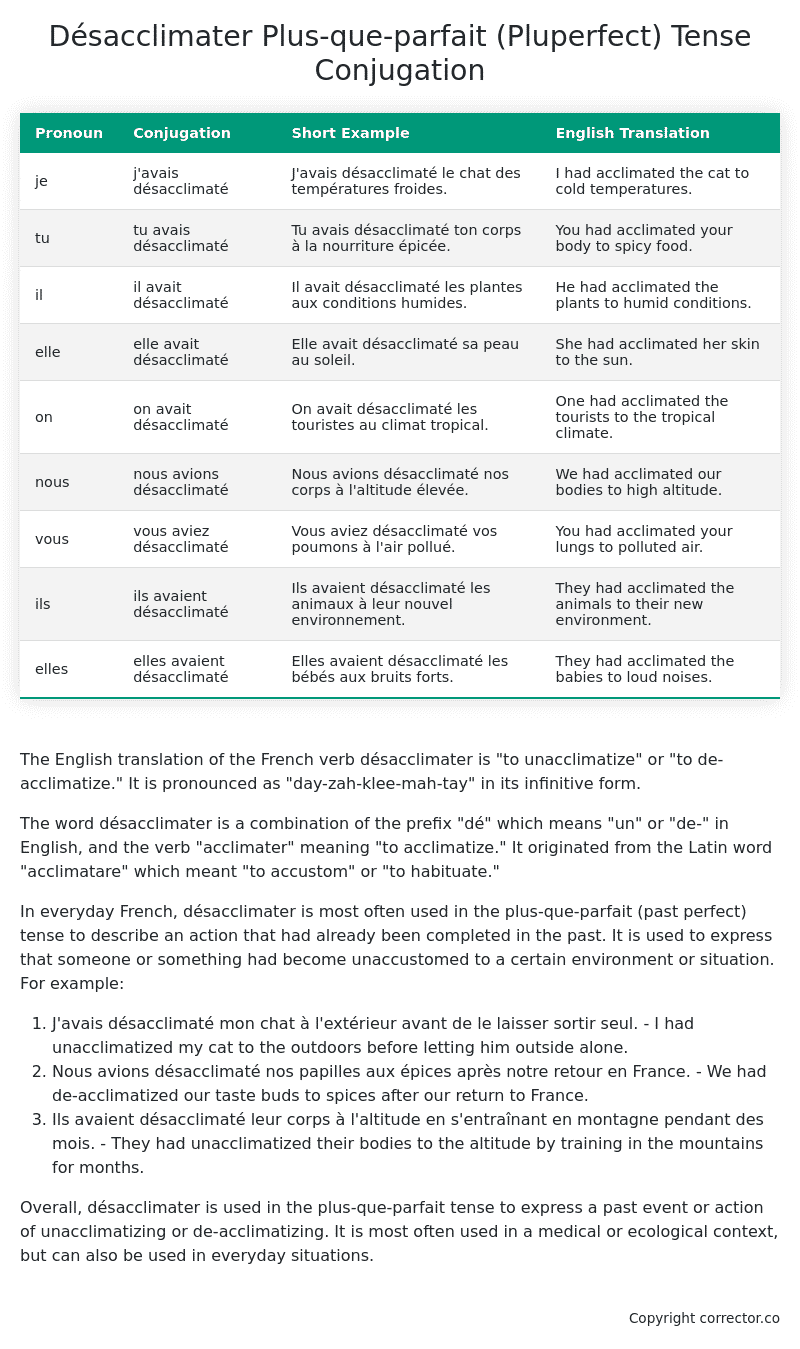Plus-que-parfait (Pluperfect) Tense Conjugation of the French Verb désacclimater
Introduction to the verb désacclimater
The English translation of the French verb désacclimater is “to unacclimatize” or “to de-acclimatize.” It is pronounced as “day-zah-klee-mah-tay” in its infinitive form.
The word désacclimater is a combination of the prefix “dé” which means “un” or “de-” in English, and the verb “acclimater” meaning “to acclimatize.” It originated from the Latin word “acclimatare” which meant “to accustom” or “to habituate.”
In everyday French, désacclimater is most often used in the plus-que-parfait (past perfect) tense to describe an action that had already been completed in the past. It is used to express that someone or something had become unaccustomed to a certain environment or situation. For example:
- J’avais désacclimaté mon chat à l’extérieur avant de le laisser sortir seul. – I had unacclimatized my cat to the outdoors before letting him outside alone.
- Nous avions désacclimaté nos papilles aux épices après notre retour en France. – We had de-acclimatized our taste buds to spices after our return to France.
- Ils avaient désacclimaté leur corps à l’altitude en s’entraînant en montagne pendant des mois. – They had unacclimatized their bodies to the altitude by training in the mountains for months.
Overall, désacclimater is used in the plus-que-parfait tense to express a past event or action of unacclimatizing or de-acclimatizing. It is most often used in a medical or ecological context, but can also be used in everyday situations.
Table of the Plus-que-parfait (Pluperfect) Tense Conjugation of désacclimater
| Pronoun | Conjugation | Short Example | English Translation |
|---|---|---|---|
| je | j’avais désacclimaté | J’avais désacclimaté le chat des températures froides. | I had acclimated the cat to cold temperatures. |
| tu | tu avais désacclimaté | Tu avais désacclimaté ton corps à la nourriture épicée. | You had acclimated your body to spicy food. |
| il | il avait désacclimaté | Il avait désacclimaté les plantes aux conditions humides. | He had acclimated the plants to humid conditions. |
| elle | elle avait désacclimaté | Elle avait désacclimaté sa peau au soleil. | She had acclimated her skin to the sun. |
| on | on avait désacclimaté | On avait désacclimaté les touristes au climat tropical. | One had acclimated the tourists to the tropical climate. |
| nous | nous avions désacclimaté | Nous avions désacclimaté nos corps à l’altitude élevée. | We had acclimated our bodies to high altitude. |
| vous | vous aviez désacclimaté | Vous aviez désacclimaté vos poumons à l’air pollué. | You had acclimated your lungs to polluted air. |
| ils | ils avaient désacclimaté | Ils avaient désacclimaté les animaux à leur nouvel environnement. | They had acclimated the animals to their new environment. |
| elles | elles avaient désacclimaté | Elles avaient désacclimaté les bébés aux bruits forts. | They had acclimated the babies to loud noises. |
Other Conjugations for Désacclimater.
Le Present (Present Tense) Conjugation of the French Verb désacclimater
Imparfait (Imperfect) Tense Conjugation of the French Verb désacclimater
Passé Simple (Simple Past) Tense Conjugation of the French Verb désacclimater
Passé Composé (Present Perfect) Tense Conjugation of the French Verb désacclimater
Futur Simple (Simple Future) Tense Conjugation of the French Verb désacclimater
Futur Proche (Near Future) Tense Conjugation of the French Verb désacclimater
Plus-que-parfait (Pluperfect) Tense Conjugation of the French Verb désacclimater (this article)
Passé Antérieur (Past Anterior) Tense Conjugation of the French Verb désacclimater
Futur Antérieur (Future Anterior) Tense Conjugation of the French Verb désacclimater
Subjonctif Présent (Subjunctive Present) Tense Conjugation of the French Verb désacclimater
Subjonctif Passé (Subjunctive Past) Tense Conjugation of the French Verb désacclimater
Subjonctif Imparfait (Subjunctive Imperfect) Tense Conjugation of the French Verb désacclimater
Conditionnel Présent (Conditional Present) Tense Conjugation of the French Verb désacclimater
Conditionnel Passé (Conditional Past) Tense Conjugation of the French Verb désacclimater
L’impératif Présent (Imperative Present) Tense Conjugation of the French Verb désacclimater
L’infinitif Présent (Infinitive Present) Tense Conjugation of the French Verb désacclimater
Struggling with French verbs or the language in general? Why not use our free French Grammar Checker – no registration required!
Get a FREE Download Study Sheet of this Conjugation 🔥
Simply right click the image below, click “save image” and get your free reference for the désacclimater Plus-que-parfait tense conjugation!

Désacclimater – About the French Plus-que-parfait (Pluperfect) Tense
Tense Formation
Common everyday usage patterns
Sequencing of past events
Background information
Hypothetical or reported speech
Interactions with other tenses
Summary
I hope you enjoyed this article on the verb désacclimater. Still in a learning mood? Check out another TOTALLY random French verb conjugation!


